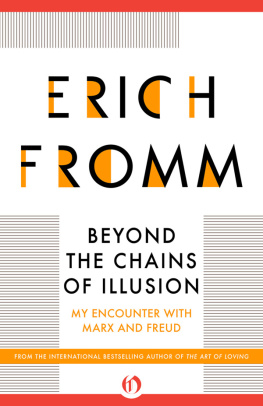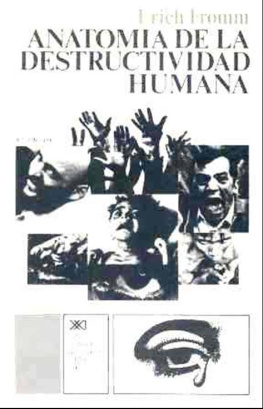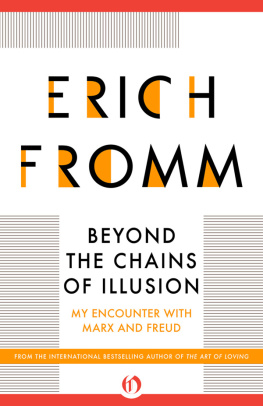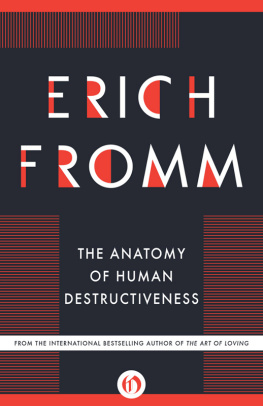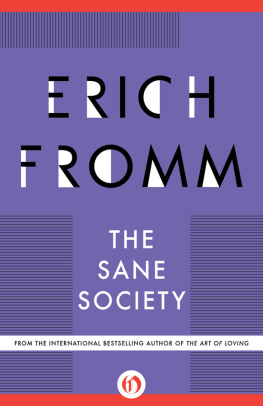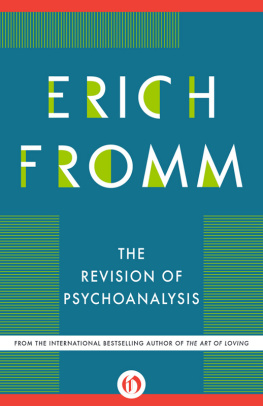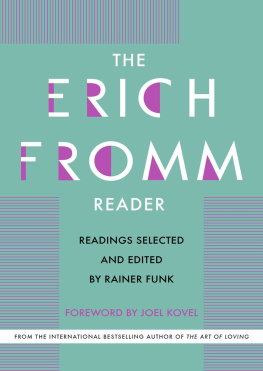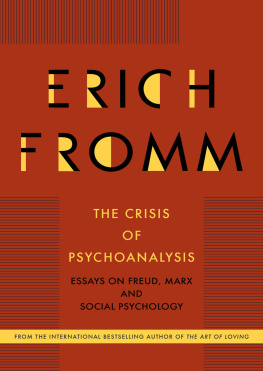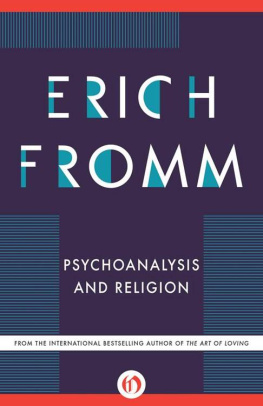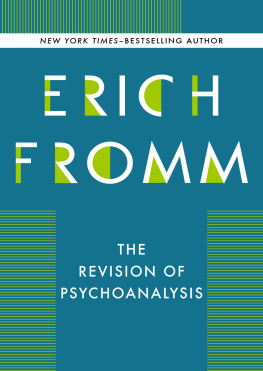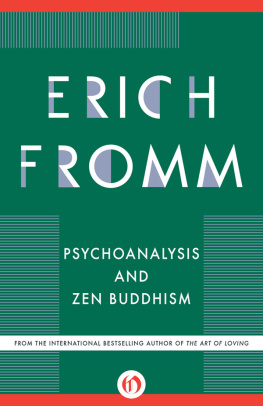Erich Fromm - The Crisis of Psychoanalysis
Here you can read online Erich Fromm - The Crisis of Psychoanalysis full text of the book (entire story) in english for free. Download pdf and epub, get meaning, cover and reviews about this ebook. publisher: Open Road Media, genre: Science. Description of the work, (preface) as well as reviews are available. Best literature library LitArk.com created for fans of good reading and offers a wide selection of genres:
Romance novel
Science fiction
Adventure
Detective
Science
History
Home and family
Prose
Art
Politics
Computer
Non-fiction
Religion
Business
Children
Humor
Choose a favorite category and find really read worthwhile books. Enjoy immersion in the world of imagination, feel the emotions of the characters or learn something new for yourself, make an fascinating discovery.
- Book:The Crisis of Psychoanalysis
- Author:
- Publisher:Open Road Media
- Genre:
- Rating:4 / 5
- Favourites:Add to favourites
- Your mark:
- 80
- 1
- 2
- 3
- 4
- 5
The Crisis of Psychoanalysis: summary, description and annotation
We offer to read an annotation, description, summary or preface (depends on what the author of the book "The Crisis of Psychoanalysis" wrote himself). If you haven't found the necessary information about the book — write in the comments, we will try to find it.
This book brings together Erich Fromms basic statements on the application of psychoanalytic theory to social dynamics. At the same time it offers an image of man consonant with the hopes of radical humanism.
The Crisis of Psychoanalysis is a collection of nine brilliant essays. Although his work is deeply rooted in Freudian theory, Fromm further develops Freuds doctrines by including both social and ethical dimensions and applies his discoveries and insights to address the problems we face in society at large.
The Crisis of Psychoanalysis — read online for free the complete book (whole text) full work
Below is the text of the book, divided by pages. System saving the place of the last page read, allows you to conveniently read the book "The Crisis of Psychoanalysis" online for free, without having to search again every time where you left off. Put a bookmark, and you can go to the page where you finished reading at any time.
Font size:
Interval:
Bookmark:

The Crisis of Psychoanalysis
Erich Fromm
I
Preface
This collection of essays, written at different times between 1932 and 1969, is unified by the common theme of the interrelation between psychological and sociological factors. The decision to publish also the early papers, originally published in German, was made because they are still the most complete and adequate presentation of the theoretical basis upon which my later work on the subject rests. It seems to me they are particularly timely today, when there is a great deal of discussion on this topic, particularly on the relation between the theories of Marx and Freud, a discussion which, I am afraid, is sometimes amateurish and confusing. There is little l would change in these early papers, except that today I would not write them in terms of Freuds libido theory; but this hardly matters as far as the main trend of thought is concerned. I have resisted the temptation to make any changes in the substance of the papers, but have indicated discrepancies between what they present and my present viewpoint in footnotes; the only changes I made were to shorten essays where they seemed too lengthy or where they dealt with small points that are of little interest today.
The long opening essay, The Crisis of Psychoanalysis, was written especially for this volume (along with the essay The Significance of the Theory of Mother Right for Today, and the Epilogue). Dealing primarily with psychoanalytic theory and therapy, it attempts to analyze the social determinants of the development of psychoanalysis, as does the second paper with regard to Freuds Model of Man.
The chapters differ amongst themselves also, inasmuch as they were written for different occasions. For this reason they vary not only in style, but there is also a certain amount of overlapping. This could have been avoided only by cutting them, which would have destroyed the individual character of each paper I hope the reader will bear with this, especially since, at times, even the overlapping statements are not identical but [VIII] express the ideas on one point more fully than on another, so that they may even serve to clarify one another.
The essay on The Crisis of Psychoanalysis sums up a number of ideas that I developed more extensively in a larger, as yet unpublished, study under the tentative title Humanist Psychoanalysis, supported in part by Research Grant 5 ROIMH 1314402 from the National Institute of Mental Health, U.S. Public Health Service.
I wish to express my warm thanks to Mr. Joseph Cunneen of Holt, Rinehart and Winston, who has been most helpful and understanding in editing this manuscript; to Dr. Jerome Brams for his assistance in the discussion of ego-psychology.
January, 1970
E. F.
II
The Crisis of Psychoanalysis
Contemporary Psychoanalysis is passing through a crisis which superficially manifests itself in a certain decrease in the number of students applying for training in psychoanalytic institutes, and also in the number of patients who seek help from psychoanalysts. Competing therapies have emerged in recent years which claim to have better therapeutic results and to require much less time and hence, of course, much less money. The psychoanalyst, who ten years ago was considered by the urban middle class to have the answer to its mental anguish, is now put on the defensive by his psychotherapeutic competitors and is losing his therapeutic monopoly.
In order to appreciate this crisis, it is useful to consider the history of psychoanalytic therapy. Over half a century ago psychoanalysis opened up a new field and, economically speaking, a new market. Until then one had to be insaneor to suffer from painful and socially handicapping symptomsin order to qualify for a psychiatrists help. Less extreme psychic troubles were supposed to be within the province of the minister or the family doctor, and, in most cases, one was expected to handle them oneself and to suffer, silently if need be.
When Freud started his therapeutic work he dealt with patients who were sick in the conventional sense of the word; they were suffering from aggravating symptoms like phobias, compulsions, and hysteria, even though they were not psychotic. Then analysis slowly began to extend its method to people who, traditionally, would not have been considered sick. Patients came with complaints about their inability to enjoy life, about unhappy marriages, generalized anxiety, painful feelings of loneliness, difficulties in their capacity to work, etc. In contrast to past practice, these complaints were classified as sickness and a new type of helperthe psychoanalystwas to take care of difficulties in living, which until then had not been supposed to require professional help.
This development did not occur overnight but eventually it became a very important factor in the lives of the urban middle class, especially in the United States. Until not so long ago it was almost normal for a person of a certain urban subculture to have his analyst; a good deal of the time was spent on the couch, just as people used to go to church or the temple.
The reasons for this boom of psychoanalysis are easy to recognize. This century, the age of anxiety, has produced ever-increasing loneliness and isolation. The breakdown of religion, the seeming futility of politics, the emergence of the totally alienated organization man deprived the urban middle class of a frame of orientation and of a feeling of security in a meaningless world. Although a few seemed to find new frames of orientation in surrealism, radical politics, or Zen Buddhism, in general the disenchanted liberal was looking for a philosophy that he could subscribe to without any fundamental change in his outlook, i.e., without becoming different from his friends and colleagues.
Psychoanalysis offered the satisfaction of this need. Even when the symptom was not cured, it was a great relief to be able to talk to someone who listened patiently and more or less sympathetically. That the analyst was paid for his listening was only a minor drawback; maybe it was no drawback at all, because the very fact that one paid the analyst proved that this therapy was serious, respectable, and promising. Besides, its prestige was high because it was, economically, a luxury commodity.
The analyst offered a substitute for religion, politics, and philosophy. Freud had allegedly discovered all the secrets of life: the unconscious, the Oedipus complex, the repetition of childhood experience in the present; and once one understood these concepts, nothing remained mysterious or doubtful. One was a member of a somewhat esoteric sect, with the analyst as its priest, and one felt less puzzled as well as less lonely by marking time on the couch.
This holds especially true for those who were not suffering from circumscribed symptoms but from general malaise. The latter, in order to change in any meaningful way, would have had to have a vision of what a non-alienated person is like, of what it could mean to live a life centered around being rather than around having and using. Such a vision would have required a radical critique of their society, its overt and especially its hidden norms and principles; it would have required the courage to cut many comforting and protecting ties and to find oneself in a minority; it would have also required more psychoanalysts who themselves are not caught in the psychological and spiritual mess of a cybernated and industrialized life.
One can often observe a gentlemans agreement between patient and analyst; neither of the two really wants to be shaken up by a fundamentally new experience; they are satisfied with small improvements and are unconsciously grateful to each other for not bringing into the open the unconscious collusion (to use R. D. Laings term). As long as the patient comes, talks, and pays and the analyst listens and interprets, the rules of the game are observed and the game is agreeable to both of them. Furthermore, the fact of having an analyst was frequently used to avoid a dreaded but unavoidable fact of life: that of having to make decisions and to take risks. When a difficultyor even tragicdecision could not be avoided, the addict to psychoanalysis transformed the real conflict into a neurotic one which needed to be analyzed further, sometimes until the situation that required a decision had disappeared. All too many patients were no challenge to the analyst, nor the analyst to them. Those who participated in the gentlemans agreement unconsciously did not even want to be a challenge, since nothing should rock the boat of their peaceful existence. In addition, because psychoanalysts became increasingly sure of a large supply of patients, many of them tended to become lazy and to believe the marketplace assumption that their use value must be high because their market value was high. Backed by the powerful and prestigious International Psychoanalytic Association, many believed they possessed the truth after passing through the ritual from admission to graduation. In a world where bigness and the power of the organization are guarantees of truth, they were only following the general practice.
Font size:
Interval:
Bookmark:
Similar books «The Crisis of Psychoanalysis»
Look at similar books to The Crisis of Psychoanalysis. We have selected literature similar in name and meaning in the hope of providing readers with more options to find new, interesting, not yet read works.
Discussion, reviews of the book The Crisis of Psychoanalysis and just readers' own opinions. Leave your comments, write what you think about the work, its meaning or the main characters. Specify what exactly you liked and what you didn't like, and why you think so.


